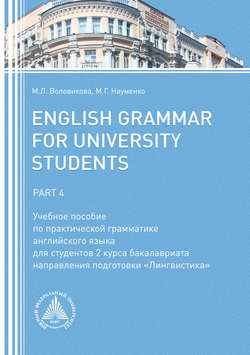Читать книгу English Grammar for University Students. Part 4 - Марина Воловикова, М. Г. Науменко - Страница 4
Module 1. The infinitive
The use of the infinitive without the particle to (the bare infinitive)
ОглавлениеThe Infinitive is used without the particle to in the following cases:
1. After auxiliary verbs.
Do you like music?
Seldom do we witness such catastrophes.
Does anyone know where I left my diary?
2. After modal verbs (except ought to) and modal expressions had better, would rather, would sooner.
You must use some verbs more than once.
We’d better not borrow Diane’s books without asking her.
She’d sooner die than give up.
3. After verbs of sense perception (see, notice, watch, observe, hear, feel, smell, etc.) as a part of the Objective Infinitive Construction.
I watched him arrive.
We noticed her run away from the building.
Note, that in passive sentences with these verbs a to-Infinitive is used.
He was watched to arrive.
He was noticed to run away from the house.
4. After verbs of inducement (let, make, have) as a part of the Objective Infinitive Construction.
I made Peter wait outside.
John lets the dog sleep on the sofa.
But! Peter was made to wait outside.
5. After phrases with but (cannot but, anything but, nothing but).
I could not but congratulate him.
She can do everything but cook.
6. In why-sentences, both affirmative and negative, where it expresses a suggestion.
Why not take advantage of the situation?
Why go there so late?
Why make so much noise?
7. In cases when two Infinitives are joined by ‘and’ or ‘or’, bare Infinitive can be used.
I want to go out and have fun and relax.
